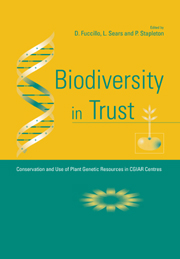Book contents
- Frontmatter
- Contents
- Preface
- Contributors
- Acronyms
- Chapter 1 Cassava
- Chapter 2 The Potato
- Chapter 3 Sweetpotato
- Chapter 4 Other Andean Roots and Tubers
- Chapter 5 Yams
- Chapter 6 Banana and Plantain
- Chapter 7 Cowpea
- Chapter 8 Chickpea
- Chapter 9 Groundnut
- Chapter 10 Lentil
- Chapter 11 Phaseolus Beans
- Chapter 12 Pigeonpea
- Chapter 13 Faba Bean
- Chapter 14 Soyabean
- Chapter 15 Barley
- Chapter 16 Maize, Tripsacum and Teosinte
- Chapter 17 Pearl Millet
- Chapter 18 Small Millets
- Chapter 19 Rice
- Chapter 20 Sorghum
- Chapter 21 Wheat
- Chapter 22 Forages
- Index
Chapter 18 - Small Millets
Published online by Cambridge University Press: 22 September 2009
- Frontmatter
- Contents
- Preface
- Contributors
- Acronyms
- Chapter 1 Cassava
- Chapter 2 The Potato
- Chapter 3 Sweetpotato
- Chapter 4 Other Andean Roots and Tubers
- Chapter 5 Yams
- Chapter 6 Banana and Plantain
- Chapter 7 Cowpea
- Chapter 8 Chickpea
- Chapter 9 Groundnut
- Chapter 10 Lentil
- Chapter 11 Phaseolus Beans
- Chapter 12 Pigeonpea
- Chapter 13 Faba Bean
- Chapter 14 Soyabean
- Chapter 15 Barley
- Chapter 16 Maize, Tripsacum and Teosinte
- Chapter 17 Pearl Millet
- Chapter 18 Small Millets
- Chapter 19 Rice
- Chapter 20 Sorghum
- Chapter 21 Wheat
- Chapter 22 Forages
- Index
Summary
Small millets are small-grained cereals mainly grown in arid, semi-arid or montane zones as rain-fed crops under marginal and submarginal conditions of soil fertility and moisture. Small millets are important to global agriculture and are major cereal crops, grown in fairly large areas of South Asia, China, the former USSR and Africa. They are also found in areas of the United States and Europe on a limited scale. Although precise estimates on their area and production are not available, these crops may occupy between 18 and 20 million ha, producing 15-18 million tonnes of grain. The region-wise distribution of area is 6.3 million ha in South Asia, 5 million ha in China, 4 million ha in USSR and 3 million ha in Africa.
Finger millet is the principal small millet species grown in South Asia, followed by kodo millet, foxtail millet, little millet, proso millet and barnyard millet, in that order. Foxtail millet and proso millet are important in China and the latter is grown extensively in southwestern USSR. In Africa, finger millet, teff and fonio have local importance (Riley 1988).
The average global productivity of small millets is almost 1 t/ha. There has been a trend in the last two decades to replace these crops with major cereals like maize and wheat, which has been a factor in the reduction of area under these crops. Presently, small millets are cultivated in areas where they produce a more dependable harvest than any other crop.
- Type
- Chapter
- Information
- Biodiversity in TrustConservation and Use of Plant Genetic Resources in CGIAR Centres, pp. 259 - 272Publisher: Cambridge University PressPrint publication year: 1997



